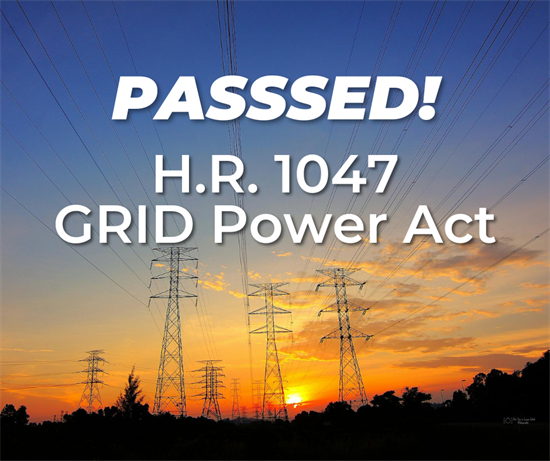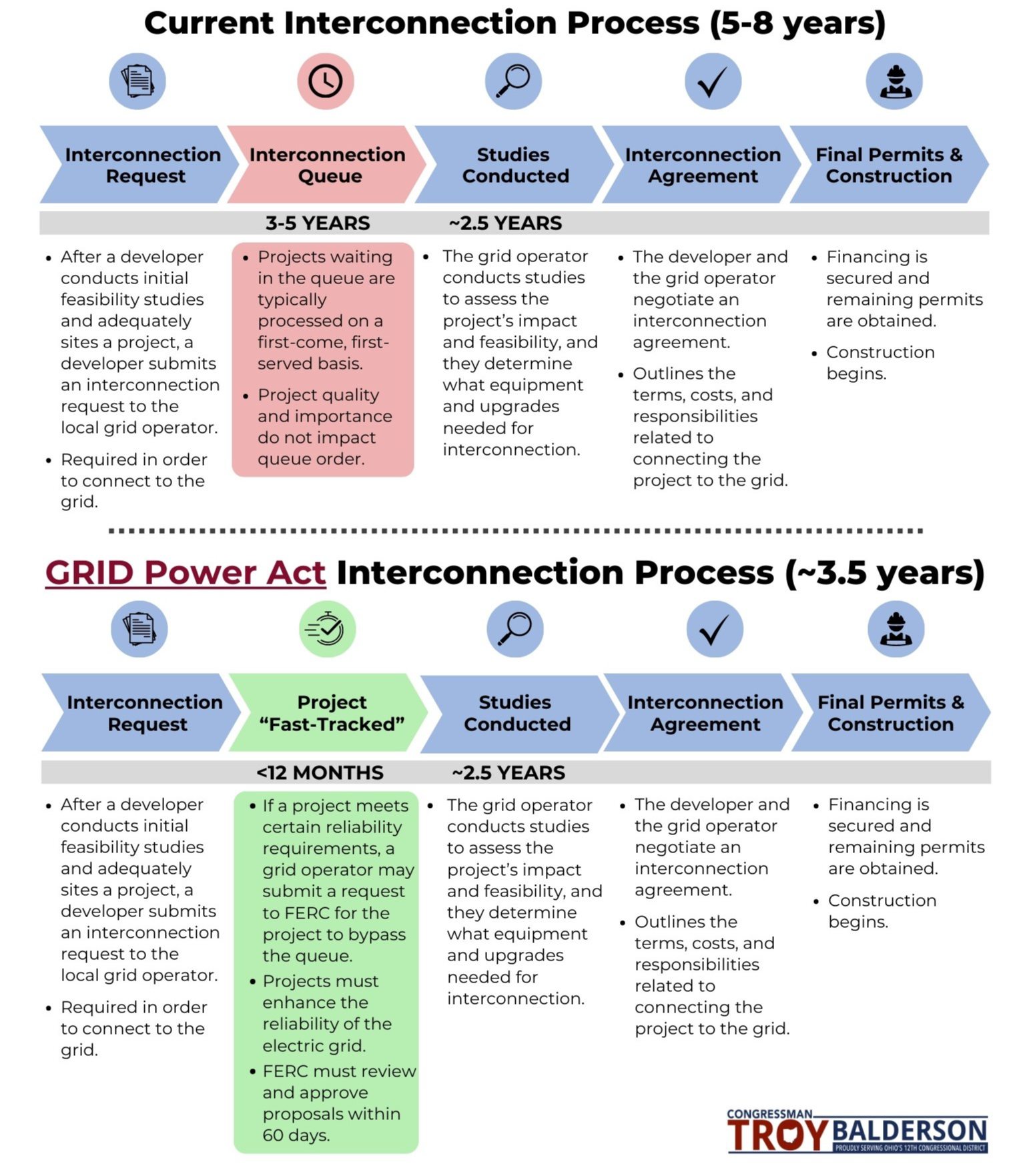WASHINGTON, D.C. – Today, the House of Representatives passed Congressman Troy Balderson’s (OH-12) bill to fast-track new power plants, ensuring the long-term reliability of the American electric grid.
H.R. 1047, the Guaranteeing Reliability through the Interconnection of Dispatchable (GRID) Power Act, makes a key improvement to the interconnection queue, where power generation projects wait in line before being reviewed by regulators. In recent years, wait times for power projects have skyrocketed up to five years on average while electricity demand surges. This legislation empowers grid operators to identify and fast-track generation projects that will provide dispatchable power and boost grid reliability.
“With American power demand far outpacing our ability to generate more electricity, our grid is heading toward a reliability crisis,” said Balderson. “The interconnection queue is overwhelmed and bogged down, leaving shovel-ready power projects waiting for years while demand continues to climb. The GRID Power Act clears the path for the most critical projects, giving grid operators the tools they need to add more dispatchable baseload power—lowering costs for households and businesses while keeping America’s grid reliable.”
Ohio is particularly impacted. PJM, the state’s sole grid operator, has announced it expects to lose about 40 gigawatts of generation by 2030—21 percent of its total capacity—while new power generation is not coming online fast enough to replace retiring plants. Between 2022 and 2023 alone, PJM saw over 11,000 megawatts of generation deactivated while only 4,000 megawatts of new capacity were added.
“It doesn’t take an expert to see that retiring power plants outpacing new generation is a problem,” Balderson continued. “This is especially concerning for Central Ohio, which has become a national hub for data center construction. These facilities are powering the American AI revolution, but we must ensure we can keep them running while also providing reliable, affordable energy to Ohio families.”
The interconnection queue has become inundated with proposed projects seeking to capitalize on the Biden Administration’s taxpayer-funded “green” energy credits. These projects, which now make up 95% of all projects in the queue, tend to be weather-dependent and cannot be dispatched at a moment’s notice to meet consumer energy needs. As power demand in Ohio and across the nation grows, the grid will require more dispatchable baseload energy to avoid rolling blackouts and power shortages.
President Trump’s AI Action Plan calls for this directly, saying the U.S. should “prioritize the interconnection of reliable, dispatchable power sources as quickly as possible and embrace new energy generation sources at the technological frontier.”
“Today’s passage of H.R. 3062, H.R. 3015, and H.R. 1047 reflects the House Committee on Energy and Commerce’s relentless work to secure American energy dominance,” said Energy and Commerce Committee Chairman Brett Guthrie (KY-02). “These bills streamline the permitting process for critical cross-border energy projects, restore expert advisory input from the coal industry that the Biden-Harris Administration eliminated, and ensure that electricity grid operators have the tools they need to secure the reliability of the bulk power system. With rising energy demand and growing threats to grid reliability, House Republicans are ensuring the U.S. has the tools to deliver affordable, abundant, and reliable energy. Thank you to Congresswoman Fedorchak, Congressman Rulli, and Congressman Balderson for their tireless work to strengthen our grid and power our communities.”
“Significant increases in electricity demand are expected in every region of the country, driven by data centers powering advancements in AI, domestic manufacturing, and the electrification of various sectors of the economy,” said Todd Snitcher, President & CEO of the Electric Power Supply Association (EPSA). “Grid operators should be given significant flexibility to address current or future reliability concerns, including the creation of an accelerated interconnection for resources identified as critical to maintaining reliability. The bill appropriately requires stakeholder feedback and FERC approval before any changes are made, ensuring that all viewpoints are heard. EPSA is grateful to Congressman Balderson for his leadership on this critical issue and commitment to electric grid reliability.”
“AXPC applauds Congressman Balderson, Senator Hoeven, and Senator Young’s efforts to prioritize projects that enhance grid reliability and capacity,” said Anne Bradbury, CEO of the American Exploration & Production Council (AXPC). “As our nation's power demand continues to rise, it is critical that we don’t delay consideration of power-generation projects, such as those that use natural gas, that can provide needed dispatchable power and enhance reliability.”
“Electrical grid reliability is a critical issue for Ohio’s economy, especially as we emphasize advanced manufacturing and energy-intensive advancements in technology,” said Steve Stivers, President & CEO of the Ohio Chamber of Commerce. “Legislation like the GRID Power Act will serve to expedite power generation projects that can improve the resilience and reliability of energy supply for the economy of the 21st Century. We thank Congressman Balderson for his leadership in addressing the critical energy needs of American businesses and consumers, and look forward to working with him to advance this common-sense proposal.”
“We applaud Congressman Balderson for the GRID Power Act and for pushing reforms and finding solutions to ensure a strong energy future,” said Rob Brundrett, President of the Ohio Oil and Gas Association (OOGA). “This legislation will benefit Ohio’s energy consumers and help stabilize our energy grid. OOGA strongly supports Congressman Balderson’s efforts to prioritize reliable, abundant and easily dispatchable natural gas to power our homes and businesses by bringing innovative ideas to the queue reform process.”
“As discussions around generation sufficiency persist across the 13-state territory managed by PJM Interconnection, Ohio’s manufacturing sector maintains that open competition is the most effective way to meet rising energy needs,” said Ryan Augsburger, President of The Ohio Manufacturers’ Association (OMA). “The OMA advocates for improvements to the interconnection queue process to accelerate and streamline the integration of new power sources into the grid. Congressman Balderson’s proposed legislation marks an encouraging step toward meaningful and much-needed modernization.”
“Ohio’s Electric Cooperatives and Buckeye Power applaud Rep. Balderson and efforts to more quickly and efficiently bring reliable, dispatchable power onto the grid,” said Craig Grooms, CEO of Ohio’s Electric Cooperatives and Buckeye Power. “In order to meet the dramatic increase in energy demand in the United States, grid operators must be able to prioritize power generation resources that operate when the sun is not shining and the wind is not blowing.”
“The Guaranteeing Reliability through the Interconnection of Dispatchable Power Act (GRID Power Act) is an important step toward getting dispatchable power, such as coal, natural gas, and nuclear, connected to the grid,” said Paige Lambermont, Competitive Enterprise Institute Fellow. “At present wind, solar, and battery storage projects make up 95 percent of the capacity in the interconnection queue. This bill would begin a rulemaking process to allow transmission providers to expedite and prioritize the connection of dispatchable facilities to ensure reliability. This is especially necessary at a time when power demand is rising, and reliable power that can be dispatched when needed is particularly valuable to the power grid.”
The GRID Power Act
The GRID Power Act directs the Federal Energy Regulatory Commission (FERC) to develop rules that authorize grid operators – transmission providers, Regional Transmission Organizations (RTOs), and Independent System Operators (ISOs) – to expedite critical projects that ensure grid reliability and meet growing power demands through their interconnection queues.
Under the legislation, grid operators would still be required to conduct feasibility and system impact studies on the generation projects before signing an interconnection agreement; however the operator’s ability to fast-track these projects through the queue would get them online and connected to the grid years faster. This legislation empowers grid operators to accelerate projects that:
- Provide new dispatchable power and improve grid reliability and resource adequacy;
- Address power shortages caused by retiring or offline dispatchable power; and/or
- Support increased power demand.
FERC would be required to review “fast-track” proposals within 60 days, potentially reducing the total time to approve these projects from years to months. Upon enactment, this legislation would require FERC to start the rulemaking process for this mechanism within 90 days of the bill's enactment and finalize the rules within 180 days.
Full text of the GRID Power Act can be found HERE.



